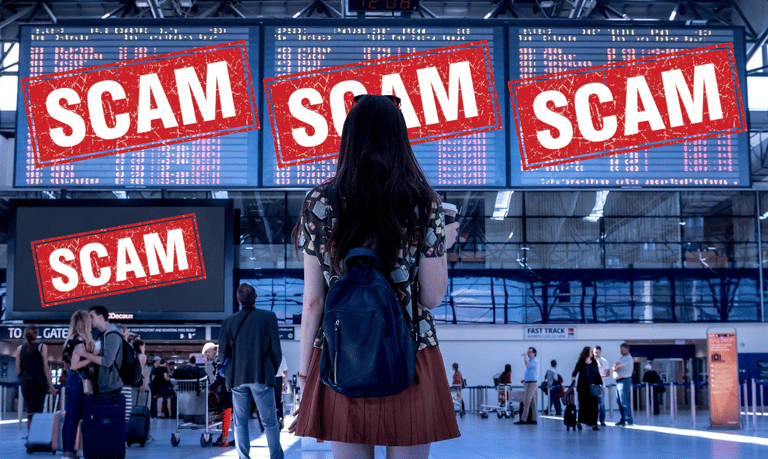Essential Safe Travel Tips for Tourists: Avoiding Travel Scams!
Charles (Chuck) Sieber
1/18/2024



Embarking on a journey exposes us to the wonders of the world, but unfortunately, it also opens the door to potential scams targeting unsuspecting travelers. This guide is designed to provide you with in-depth insights into prevalent domestic travel scams and equip you with practical strategies for a safe and enjoyable adventure.

1. The Fake Hotel Scam:
Imagine the excitement of booking a picturesque vacation rental, only to arrive and discover it's a mirage. Scammers frequently exploit popular vacation rental platforms, enticing travelers with rates that seem too good to be true. To safeguard your travel plans, delve into detailed research before booking. Read reviews from fellow travelers and ensure the property is listed on reputable websites. Beware of requests for upfront payments, especially via unconventional methods, and be cautious of owners insisting on immediate payment.
2. The Taxi Scam:
Navigating the bustling streets of a large city can become a nightmare when dealing with unscrupulous taxi drivers. In this scam, drivers may take unnecessarily longer routes, inflating fares or refusing to use the meter. Arm yourself with knowledge by researching typical routes and fare estimates before reaching your destination. Always insist on the use of the meter, ensuring it starts ticking as soon as your journey begins.
3. The ATM Scam:
ATM scams pose a serious threat to travelers worldwide. Scammers install skimming devices on ATMs to capture card information and PINs. Vigilance is key; inspect ATMs for signs of tampering, such as loose card readers. To further protect yourself, cover the keypad while entering your PIN and decline help from strangers.
4. The Street Scam:
Street scams involve scammers approaching tourists with offers of services or products, only to demand exorbitant fees or commit theft. Exercise caution when approached by strangers and avoid engaging in impromptu transactions. Be wary of anyone requesting money or personal information, and keep your belongings secure.
5. The Fake Authority Scam:
Posing as police officers or immigration officials, scammers may approach travelers, claiming to check for illegal activities. These impostors aim to steal passports or demand bribes. Protect yourself by always asking for official identification. Never hand over your passport and, if in doubt, request to speak with a supervisor or contact the local embassy for assistance.
6. The Fake Charity Scam:
Scammers often exploit the kindness of tourists by soliciting donations for fake charities. They may tug at heartstrings, claiming to support local causes like orphanages or animal sanctuaries. Before making any donations, research the organization thoroughly. Check for reviews from reputable sources and ensure the charity is registered. If uncertain, decline the donation and ask for more information.
Conclusion:
While travel scams can be disheartening, knowledge and caution are powerful tools to protect yourself. Conduct thorough research before making bookings, stay vigilant on the streets, and guard your personal information. By remaining alert, you can enjoy your travels with peace of mind.
Reporting Scams:
In the unfortunate event of falling victim to a travel scam, prompt reporting is crucial. Seek assistance from these organizations:
1. Federal Trade Commission (FTC):
File a complaint online or call 1-877-FTC-HELP (1-877-382-4357).
2. Better Business Bureau (BBB):
File a complaint online or contact your local BBB office.
3. International Association of Better Business Bureaus (IABBB):
Find information on BBBs in your area and file a complaint online.
4. Consumer Financial Protection Bureau (CFPB):
File a complaint online or call 1-855-411-2372.
5. Local Police Department:
Report the scam to your local police for investigation.
Additional Resources:
Stay informed and reduce your risk by exploring these resources:
1. U.S. Department of State:
Visit their website for travel scam information and safety tips.
2. International Air Transport Association (IATA):
Find insights on travel scams on their website.
3. TripAdvisor:
Read user-generated reviews to avoid potential scams.
4. AARP Scam Alert:
AARP offers information on scams, including travel-related frauds.
By staying informed and taking precautions, you can minimize the risk of falling victim to travel scams. Remember, organizations are ready to assist if you need to report a scam and seek justice. Safe travels!
See our Government & Non-Profit Help Resources page here

Travel Safe, Savvy, & Secure
Stay informed on the latest travel trends, news, & learn essential safety precautions, avoid travel scams, to have a stress-free adventure in the USA.


Copyright © 2026 American Travel Fun. All rights reserved.
Dream destinations for your inbox
Subscribe to our newsletter and don't miss out on the best American destinations, travel tips, reviews, and more.
We care about your data in our privacy policy.






